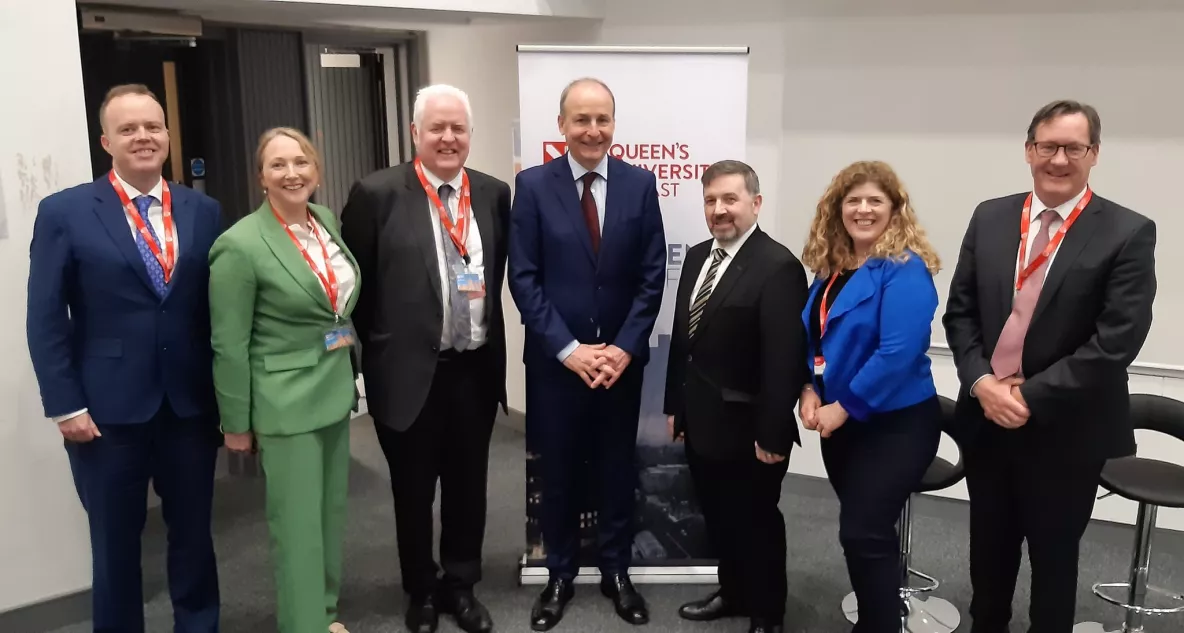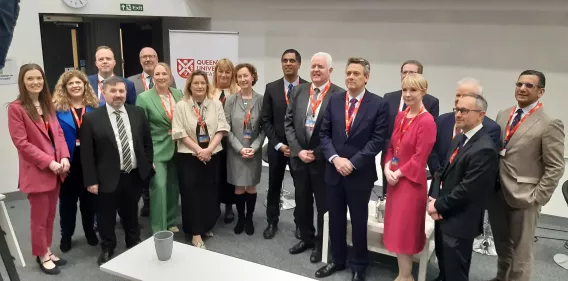
A University of Limerick academic discussed the need for greater cross-border collaboration on cancer research at a recent event to mark the 25th anniversary of the Good Friday Agreement.
Professor Aedin Culhane, Professor of Cancer Genomics at UL, met Tánaiste Micheál Martin at the Belfast Agreement 25 Cancer Showcase event in April to discuss greater cross-border collaboration on cancer research.
Professor Culhane is leading the All-Island eHealth Hub for Cancer in partnership with Professor Mark Lawler, Associate Pro-Vice-Chancellor and Professor of Digital Health at Queen’s University Belfast.
The eHealth Hub research programme is harnessing the collective data and digital health skills at UL and Queen’s to generate the data intelligence required both to understand the potential scale of the cancer problem and to help devise solutions.
‘Cancer Knows No Borders’ was the theme of the recent event which celebrated the positive impacts of the Good Friday Agreement upon cancer research and care across the island of Ireland.
The Good Friday Agreement led to peace and reconciliation in Northern Ireland, but it also yielded a less well-known dividend, providing the essential foundations for the significant progress seen in cancer outcomes and cross border cancer research and care over the past 25 years.
Professor Culhane gave a talk entitled ‘Developing an eHealth Hub for the island of Ireland’ at the event in which celebrated the past successes which led the island of Ireland to take its place on the global cancer research stage.
Professor Culhane explained that “the eHealth Hub is a great start to working towards establishing a foundation for improved cancer research tools that can seamlessly link data across the entire island of Ireland”.
Speaking at the event, Professor Lawler said that cancer research collaborations doubled in the aftermath of the Good Friday agreement, with a significant improvement in its quality also.
“All of this work has saved thousands of lives and greatly improved the quality of life of people with cancer,” Professor Lawler said.
Tánaiste Micheál Martin, also speaking at the event, described the impact of the Belfast Agreement on health co-operation on the island of Ireland as ‘transformative’.
The improvements in cancer care that have flowed over the last 25 years are a “practical demonstration of the power of positive decision-making to improve people’s lives”, he told the conference.
Professor Culhane and Lawler are co-leads of the eHealth-Hub, an All-Island collaboration for digital health research in cancer between UL’s Digital Cancer Research Centre and the Patrick G Johnston Centre for Cancer Research at Queen’s.
Recently established with a €4 million award from the Higher Education Authority Shared Island programme, the eHealth-Hub for Cancer partners with seven universities, eight hospitals, industry, and international partners to advance cancer research.
The initiative brings together multidisciplinary teams of bioinformatics experts, biostatisticians, epidemiologists, software developers, clinicians, and cancer doctors to develop innovative algorithms and software for digital health and real-world evidence research.
The UL Digital Cancer Research Centre, a recently launched research centre of excellence, provides an interdisciplinary and creative scientific environment for over 100 scientists in 10 research labs. Supported by cutting-edge technologies in single cell spatial biology, biomaterials engineering, software engineering, data science, and bioinformatics, the LDCRC is dedicated to advancing cancer research.
